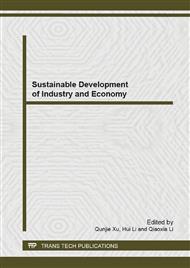p.356
p.362
p.366
p.371
p.377
p.381
p.385
p.389
p.393
An Empirical Study on China's Energy Consumption, Carbon Emissions and Economic Growth
Abstract:
With the development of low-carbon economy, it is necessary to explore the relationship between energy consumption, carbon emissions and the economic growth correctly. In this paper, the VAR model was proposed with analyzing the relationship between the three factories through pulse response graph. Through the empirical investigation, the result shows: increasing energy consumption can promote economic growth, while the increasing consumption will also raise emissions of carbon. However, the emissions of carbon have negative effect on economic growth. Therefore, we must correctly handle the relationship between the three factories. Thus, it offers the best way to develop the economic in this paper is to develop the low carbon economy.
Info:
Periodical:
Pages:
377-380
Citation:
Online since:
December 2013
Authors:
Keywords:
Price:
Сopyright:
© 2014 Trans Tech Publications Ltd. All Rights Reserved
Share:
Citation:


